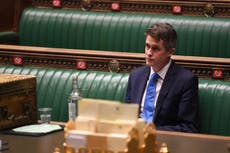Is there any point to Gavin Williamson’s free speech reforms?
The last thing the world needs is a so-called champion appointed by a Tory government with an agenda, writes Sean O’Grady


Arguably, the appointment of a “free speech champion” and strengthening the laws around freedom of expression in universities is at best unnecessary, and at worst another cynical attempt to start a culture war.
Gavin Williamson, the beleaguered education secretary, may have looked enviously at the successful forays into cultural combat recently undertaken by Priti Patel, Liz Truss, Oliver Dowden and the prime minister himself, (on Black Lives Matter protests, lefty lawyers, racial justice, statues and the BBC), and fancied a slice of the action himself.
Nothing delights the Tory base so much as watching a cabinet minister get tough on “wokery” and pour scorn on the sensibilities of ministries and progressives. It’s like a legal high (or would be, if legal highs hadn’t actually been made illegal).
A bunch of laissez-faire Tory MPs, led by the former Brexit secretary David Davis, have been trying to get their own piece of legislation on free speech on to the statute book; Williamson’s move may be a way of appeasing them. In any case, he needs all the support he can get from Tory backbenchers and the grassroots if he is to keep his job.
On the face of the statistics, though, there is little problem with free speech on university campuses. The Office for Students, the regulator of higher education in England, published statistics for 2017-18 that seem to confirm that most external speaker meetings pass without incident:
Number of events and speakers: 59,574
Number approved with conditions: 2,153
Number referred to highest body: 314
Number rejected: 53
Of the 53, some will no doubt have fallen foul of the law (prospectively) or for some other legitimate reason. Perhaps the numbers are artificially low because speakers will “self-cancel” to avoid harassment. Other prohibited meetings, though, might well represent an unjustified assault on the rights of man (or person). There are certainly high-profile cases featured in the press affecting academics and others facing difficulties and abuse when they seek to voice an unwelcome (to some) or offensive (to some) point of view.
It is nothing new: for decades politicians, usually Conservative, have been called fascists and pelted with eggs if they dared to turn up to make the case for capitalism. For some, such as the late Keith Joseph, it became a personal crusade, if a strange one.
Student debating societies sometimes cannot resist the temptation to invite someone who they well know will cause trouble, and generate welcome publicity. Often the speakers themselves are soldiers in some or other politico-cultural conflict, such as over trans rights, “rewriting history”, statues and monuments, Israel or Islam. Thus, freedom of speech inevitably gets tangled up with rows about, say, transphobia or Zionism. The debates are rarely decorous, either in the seminar rooms or when they reach social media and the press.
But there is already a significant body of law and convention governing freedom of speech. Indeed, in England and Wales, a relevant duty on university governing bodies has been in place since the Education (No. 2) Act was passed in 1986. It reads as follows: “Every individual and body of persons concerned in the government of any establishment ... shall take such steps as are reasonably practicable to ensure that freedom of speech within the law is secured for members, students and employees of the establishment and for visiting speakers.”
There is also plenty of statute and case law relating, for example, to incitement of racial and religious hatred, slander and terrorism to constrain the malign and allow others to have their say.
Williamson, though, wishes to go further, adding an obligation to actively promote free speech and to compensate individuals found by a court to have had their freedom of speech unlawfully restrained. The obligation would extend to student unions, and will no doubt be resisted or ignored, ironically because it intrudes in their own freedom to invite who the hell they want to hear from.
Whether quasi-independent debating societies, such as the Oxford Union, are going to regulated is unclear. No doubt they could hold a debate and invite former presidents to speak, such as Boris Johnson, Michael Gove and William Hague.
The problems are obvious. Soon, a court of law will find itself, in effect, involved in judging whether, say, gender is a biological “fact” or otherwise. Or where criticism of the policies of the government of Israel ends and antisemitism begins. A court is not the ideal place to settle such disputes. The only conceivable “benefit” is that such cases will make good copy for the media and suitable material for speeches at party conferences.
Nor is the role of the free speech champion well thought through. Presumably, some wise and good-natured individual entirely free of prejudice will be asked to sit on the board of the Office for Students. From their position of influence they would, say, dispense emollient advice to a troubled student politics society, helpfully suggesting that Toby Young might be an interesting contributor at their next soirée, but David Irving would be pushing it a bit.
The champion wouldn’t be much help in determining who is or is not “transphobic”. They would probably end up being “cancelled” themselves, which is to say ignored, because the right to cancel is a freedom in itself, and should be inviolable too. Universities and student unions should be self-governing and independent. They don’t need or want to be advised or told what to do by some ludicrous “champion”.
There is a fallacy at the centre of Williamson’s plans. All have a right to free speech under the law; but no one, not even Conservative-leaning commentators, has a human right to speak at any given venue or platform – whether in a university lecture hall or on Twitter. In the age of social media and the web, there are in fact no real limits of freedom of expression in any case, and sadly not even the law has much effect on the electronic effluent polluting the internet.
There are big names and powerful tech giants; but also competition. If Twitter has had enough of you, you can always go on Parler, and if a university society withdraws an invitation, as it is entitled to do so, you can speak elsewhere or publish your views to a global audience in a way unprecedented in human history. If there can be such a thing as too much freedom of speech the world passed that point some years ago. The last thing it needs is a “champion” appointed by a Tory government with an agenda.


Join our commenting forum
Join thought-provoking conversations, follow other Independent readers and see their replies
Comments